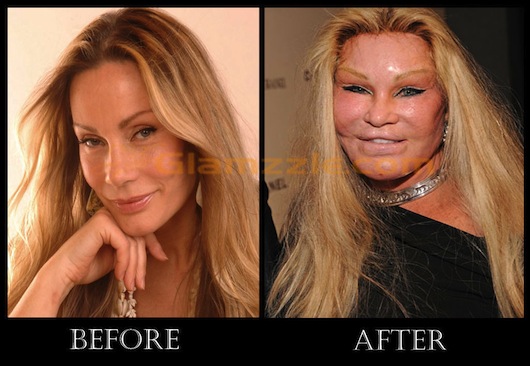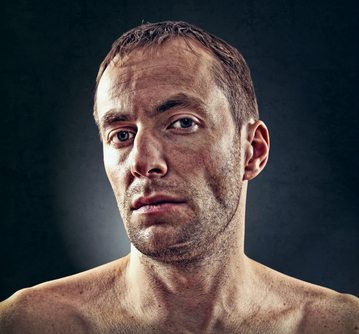Should we be banning plastic?
Bet that you think this is a piece about going green. It’s not.
Does anyone remember the scandalous New York socialite Joycelyn Wildenstein and her obsession with endless plastic surgery in an attempt to look like a wild cat? I still recall when I received the issue of New York magazine that had her as the cover; honestly, I thought it was a promotion for the musical Cats or the Lion King.
Check this out:
And this is the before and after shot:

What we are seeing is a side effect of society’s obsession with youth. Poor Joycelyn -she was once a gorgeous woman. Now, she is simply a wealthy woman with more plastic on her face than a landfill.
The reason that I am focusing on this today is that I was up in NYC over the weekend visiting with friends. I managed to catch the preview of ‘It’s Only a Play,’ featuring among other notables, the brilliant Stockard Channing.
This is what Stockard used to look like:
Beautiful, talented, a picture of aging well. Perhaps she has had a few things done here but she looked natural.
This is the Stockard I saw on Saturday:
Both my friend and I were stunned when she walked onstage for her first line.
And then, we went to dinner, where four couples, clearly old, old friends, were meeting for dinner. Several of the women were sporting almost as much plastic as Jocelyn and Stockard. And it showed.
According to 2013 statistics from the American Society for Aesthetic Plastic Surgery:
- Over 11 million surgical and nonsurgical cosmetic procedures were performed in the United States. Since 1997, there has been a 279% increase in the total number of cosmetic procedures.
- Women has more than 10.3 million procedures, accounting for almost 91% of the total. These include breast augmentation, liposuction, tummy tucks, breast lifts and eyelid surgery.
- 42% of the procedures were done in people between the ages of 35 and 50, while people between the agers of 51 and 64 accounted for 30% of the procedures.
- The total bill exceeds $12 billion.
- The use of injectables — botox and fillers — saw an increase of 21% in 2013.
What has happened to aging gracefully?
I am a true believer in feeling good and looking good and if a few injections or a nip here and a tuck there makes you feel better, go for it! But when we become so obsessed that it becomes an addiction, when as a society, we are spending tens of billions of dollars on looking differently rather than seeing differently, it implies that our priorities are a dollar short and a day late. Unfortunately, I spent more time astonished by Stockard’s new face than by her performance. We even googled her image at intermission to see if it was make up to accentuate her character’s flaws. Rather, it was plastic that accentuated her surgeon’s character flaws.
I find that sad. I find it even sadder that the obsession with selfies has translated into a growing demand for procedures that are focused on a younger clientele. Indeed, surgeons are reporting that growing numbers of people under the age of 18 are having surgery done. Considered by some physicians as ‘hyper-vanity,’ the increase apparently reflects an increasing obsession with how peers and followers view young women among various social platforms; if you want to grow your following, focus on your looks — pouty lips, booties and cleavage.
While the media focus has primarily been on celebrity clientele, social media is changing the mirror reflection and it’s not a pretty sight, especially when rejuvenation is hitting the under 18 set. Oxymoron, anyone?
The brilliant Joan Rivers (R.I.P) was quoted as saying that she has had so much plastic surgery that when she died, they would be donating her body to Tupperware.
Is it time to ban plastic?
Read More
Guyside: Your Skin
Bob is out today so I’m taking over Guyside this week. And what better than continue the topic that I started on Monday about skincare. Only this time, it’s the guys that I am most worried about. Did you know that not only has the bulk of research conducted on UV exposure and sun protection been conducted in women, but the few that have looked at men have discovered a rather troubling fact:
Guys are far less concerned about visible aging than women, in part due to different cultural pressures to retain a youthful look. But more importantly, when they skip the sunscreen, they do so because they actually like the effects of UV exposure on their skin. And, I am not referring to the glow of a tan but the ‘ruggedness’ of weathered skin.
When you go for rugged and weathered you may also be signing up for non-melanoma skin cancer (aka squamous cell), which men develop significantly more often than women. The reasons go beyond the lack of use of skin protection and cultural mores; laboratory studies in mice suggest that there are gender differences in how male and female skin reacts to UV light, and theoretically, men may produce less catalase, an enzyme that protects cells from damage.
It’s only squamous cell, right?! Well, hold on, because while it is not usually malignant, it can spread and cause serious complications when it gets into the lymph nodes. In some men, it’s a downright death sentence.
Getting back to the issue at hand: what does it take to get men to pay attention?
I’m not a man so I can only speak for the research. And in the scant research that has been conducted on this topic in men, the answer is pretty simple:
shock and awe.
In fact, when researchers gathered a small group of men between the ages of 18 and 34 and exposed them to a computer program that demonstrated their personal aging process based on UV and non-UV exposure, the guys who were immediately shocked by what they saw were the ones who indicated that the experience would affect their current use of sun protection agents and sun exposure behaviors. And among the ten guys who didn’t care? They tended to raise the positives about the way they appeared in the images.
“I think that I look quite tough…experienced…and weathered.” One man noted that he would have to be persuaded about the risk to his health.
It appears that on average, men engage in riskier sun exposure behaviors than women. Slapping on sunscreen is seen as feminine and some men are simply unfazed by facial aging, noting that wrinkles add character and rugged good looks.
But here’s the rub: after the rugged good looks phase come issues that are difficult to deal with. My dad, for example, grew up on a beach in the 30s and 40s. He’s spent his life having patches of skin removed and once handsome, he is simply an example of skin gone wrong.
Bottom line: sunscreen – wear it. And rugged good looks? All I can say is that some of you may remember the Marlboro Man. Four of these men died as a result of their behavior, in this case, smoking. But more importantly, statistics show that more than half of men don’t use sunscreen and about 71% don’t know squat about cancer warning signs.
Rugged good looks fade. Skin cancer doesn’t.
Read MoreGot skin in the game of life? You best take care of it!
 When it comes to health, many of us neglect our skin. But think about it: its protection allows us to function and when it is well cared for and it allows our inner beauty to shine through. And yet, few of us think beyond the obvious appearance issues to the fact that the effects of aging on skin can lead to certain dermatological conditions that cause illness and even death. Researchers say that in the U.S., a majority of people over the age of 65 have at least one skin disorder; in the UK, 70% of older people experience skin conditions, many of which are preventable.
When it comes to health, many of us neglect our skin. But think about it: its protection allows us to function and when it is well cared for and it allows our inner beauty to shine through. And yet, few of us think beyond the obvious appearance issues to the fact that the effects of aging on skin can lead to certain dermatological conditions that cause illness and even death. Researchers say that in the U.S., a majority of people over the age of 65 have at least one skin disorder; in the UK, 70% of older people experience skin conditions, many of which are preventable.
Guess what? I’m not simply talking skin cancer. Rather, I’m referring to dry skin, inflammatory eczema on the lower extremities, pressure ulcers (when an area of the skin breaks down due to pressure placed on it) tears, wounds itching and an increased bacterial and fungal infections.
The environment: Some of the challenges that we face are directly related to the environment. Factors like air pollution, smoking and of course, regular exposure to UV radiation can lead to deep wrinkles, age spots, and leathery appearance. The message is simple, if not obvious: don’t smoke, wear sunscreen and try to minimize regular exposure to smog infested cities (of course, the latter cannot always be avoided).
Physical factors: A condition known as xerosis cutis i.e. abnormally dry skin, occurs in up to 85% of older adults. It is related to a decline in skin fats and reduced secretion of sebum — the oily, waxy matter that is secreted to keep the skin lubricated and waterproofed. When the skin is abnormally dry, it can increase the inclination to itch and scratch, with in turn, may breakdown the skin and cause wounds and infections. Although there is little that can be done to avoid some of the natural processes of aging, it’s critical to avoid overwashing with soaps and detergents, both of which can remove grease from the skin and lead to scaling and itching. Importantly, air condition and heating. which dry out the air, can exacerbate dry skin and while humidity is uncomfortable, it’s critical. During winter, hydrate the air by running a humidifier. Regular use of emollient-rich creams and moisturizers, like Aveeno or Roc or Nivea can also ward off the time effects of dry skin. Be sure to read the label of popular moisturizers to insure that they contain humectants, which help draw water to the skin.
Another important consideration is the physical integrity of the skin and the way that the skin remodels itself as we age, increasing the predisposition to tears, wounds and pressure ulcers. Unfortunately, science has not caught up with the natural aging process and there isn’t a lot of strong evidence to support one strategy over another. There is indication, however, that knowing your risk before being exposed to situations that might cause pressure ulcers (e.g. bed rest) can help to insure that you take steps before they happen. Avoid rigorous scrubbing of the skin, especially over the bonier areas, as this can increase the risk of later problems. Treat stress incontinence or overactive bladder now, before it regularly exposes the skin to moisture that again, can cause problems down the line. And that eight glasses of water rule? It my actually help your skin in the long run – hydration is key! Avoid too much caffeine and insure that you are eating fruits and veggies with high water contents, like melon, tomatoes and lettuce.
An additional solution may be the use of 0.4% topical retinoids. Research has shown that retinoids can make skin look ‘more youthful, ‘ and may even increase the ability of polysaccharides to retain water in the outer skin layer and promote the production of collagen, which keeps the skin elastic. Additionally, some studies have shown that prolonged use of topical retinoids may improve the skin’s matrix, making it less susceptible to injury and pressure ulcers.
The bottom line is that our skin deserves a lot more attention than we give it and engaging in protective strategies now may result in a payoff later in life. Basic skincare is essential. There is no panacea but taking the appropriate steps will keep your skin the game of life longer.
Read More
Reinventing Women: An Open Call
I’ve got a little secret to share with you: I am in the midst of a career change or at least, a significant shift in what I’ve been doing and what I will be doing. That’s all that I am able to say right now but as I move through my journey of reinventing women, I started to recall that about a year and a half ago I ran an ongoing feature about women who were doing exactly what I am doing right now — reinventing themselves. And so, I thought that while I am in the midst of my own shift, I would put out another open call for your stories. One of the most important things that we can do is share our stories with one another and support each other through the different phases of life, love and career. Inspiration can come from the strangest places sometimes.
Consider this an open call!
I want to hear about the career or life changes you’ve made or are in the process of making — the ‘why,’ ‘what,’ and ‘how’ as well as any other nugget of wisdom that you might impart to others considering a similar reawakening.
If you are a woman, age 44 or older and want to share the story of your transition (or transitions), drop me an email at flashfree111@gmail.com. Tell me a little about you, your age and a snippet of the wisdom or learnings that you’d like to impart to other readers. I am hoping to find at least 10 more women willing to share their stories, their triumphs, their failures and their lessons.
If you’re at a loss, check out the varied stories of three women, collected a few years back. They are likely to inspire and help shake a few tail feathers too!
Reinventing Women. It’s an ongoing movement and it’s all about you!
Read MoreSex Shaming Has No Age Limits: Guest Post by Walker Thornton
A few weeks ago I wrote a piece in response to a Huff Post article about aging and cloaking and sex in midlife. That topic reared its head again this week in a Facebook group and I was fortunate to be turned onto a brilliant post by fellow writer, Walker Thornton. For those of you who are unfamiliar with Walker or her work, she is a writer, sex educator and public speaker, and is entrenched in midlife women’s sexuality. I encourage you to visit her website. And please, show some love; this is an important topic that deserves attention and dialogue. I am honored to feature it on Flashfree.
[Nu (Nu debut). Artist: Jean Metzinger, 1911]
Why is it that some women feel compelled to shame other women? To label their activities as slutty and dismiss their stories? It has happened to me and other women writers I know; it seems to occur when we choose to be open about our sex lives. There will always be some self-appointed know-it-all ready to shame, judge or blame and then tell women what they “should” do. There are no shoulds when it comes to sex…unless we’re talking about protection from disease and safety. And, even then, who invested me or you with the power to force our opinions on someone else?
I’m fuming this morning over some of the conversations spurred on by an article Robin Korth wrote about a dating encounter. Things were going well until they got to the sex part and then 55 yr old Dave (she doesn’t share what he looks like) became completely turned off by the body of the similarly aged woman he was about to have sex with. Dave clearly has issues. He wanted her hair to be longer, he wanted her to wear the little black dress, he had to have sex with her in the dark so he could pretend she was young. A man with issues. She chose not to give into his demands and her story has provoked many people. Some people were irritated by her description of her size 6 body. One older woman said that mature women should never show their naked bodies to a man…we’ll never have sex again (what Kool Aid is she drinking?). And of course there was male-bashing.
We live in an ageist culture, surrounded by myths, put-downs and advertising promises all designed to make us feel dissatisfied with ourselves at a given age. This is really on my mind as I approach 60 in a matter of days–single and on a dating site. I’m not going to lie about my age and I’m not going to reach out for pills and injections or surgery to try to erase the years. Admittedly it’s hard to look in the mirror sometimes and see the changes in my body but I consider myself blessed to have made it this far in life, relatively unscathed.
I don’t intend to let anyone dictate how I show up for sex or work or walking down the street. And, I hope you won’t either.
We bring ourselves to every situation, every relationship just as we are. And, we’re accepted for that or we’re not. Those who can’t see our true beauty aren’t worthy of being in our lives. Isn’t it that simple? If any one person is judging us or telling us what we have to wear, or how to ‘show up’ they aren’t really seeing us. And clearly that person isn’t the least bit interested in true engagement. That’s where we get to exercise our choice–to pursue a fuller life, to find a more compatible partner, to let go of a ‘friend’ who no longer supports us. We can choose who comes into our life. We can invite or deny access to our bed.
One of the conversations that got under my skin had to do with letting men see our naked bodies. It was suggested that mature women shouldn’t let a man see them naked. Why on earth would a woman want to have sex with a man who couldn’t bear to see her body? Should she hide in the dark, keeping her beautiful, aging body cloaked as if it were a thing of shame?
The best sex you’ll ever have is Naked Sex.
Naked Sex is sex where both parties are willing to drop their protective armor and allow themselves to become fully immersed in the experience. There is no subjugating our own desires to make sure he’s happy. No hiding because you fear he/she won’t like your body. No manipulation, no coercion.
Naked Sex is about showing the real you. You can be naked or sensuously draped in lingerie that excites your senses. Both of you take ownership of your own desires and needs. You are able to communicate with each other and willingly enter into a moment of sexual pleasure. It’s when we find each other to be equally engaged and desirous that we have the most satisfying experiences.
Feel free to share your thoughts in a civil, sex-positive manner. No sex shaming here!
About Walker Thornton…
Walker Thornton is a writer, sex educator and public speaker. She is a strong advocate for midlife women’s sexuality, encouraging women to ‘step into their desire’. Kinkly.com ranked her blog, WalkerThornton.com, #17 in their top 100 Sex Blogging Superheroes of 2013. Walker is the Sexual Health columnist for Midlife Boulevard and writes about sex and the older adult for Kinkly.com. You can connect with her on her website (www.walkerthornton.com ), Facebook (https://facebook.com/AWomansPage ) Twitter (http://twitter.com/WalkerThornton) and Google+ (https://plus.google.com/u/0/+WalkerThornton/posts ).
Read More
Guyside: A few simple tasks — no crunches required
 If you (and I DO NOT recommend it) judged what male health was all about by looking at popular culture, I think it could be summed up in one word: abs. Walk past a magazine rack and it’s all abs, all the time. But there’s a lot more to it than that.
If you (and I DO NOT recommend it) judged what male health was all about by looking at popular culture, I think it could be summed up in one word: abs. Walk past a magazine rack and it’s all abs, all the time. But there’s a lot more to it than that.
When it comes to health, we men can be our own worst enemy. According to the US government’s Medline, men are more likely to smoke, to drink, to ignore symptoms, to put off health care visits, and to make risky health choices. So today, a few simple tasks to get you back on track if you’ve strayed.
#1: The next few times you’re at a pharmacy, use the automated blood pressure checker. If it’s high compared to the guidelines printed on the machine, DON’T ignore it. Follow up.
#2: Get a cholesterol check. This is especially important if you have a history of heart disease, but it’s a good idea for everyone.
#3: If you’re getting drunk regularly, slow down. Binge drinking isn’t good for anything and it’s pretty bad for your health.
#4: This is a tough one for a lot of guys. Colon Cancer. At its least invasive, you do one of those smear your poo on a stick and then on a test strip thing. Gross, but not too bad. The finger’s next. Sigmoidscopy and colonoscopy are the final frontiers, so to speak. I am a little squeamish about stuff related to the old intestinal system, but you know what? SUCK IT UP. It’s important.
#5: if you’re smoking? Stop. There’s nothing good for you there.
And the final tip: to borrow from the Homeland Security stuff, if you see something, say something. When I got diagnosed with bladder cancer, it was because I acted when I saw blood in my urine. If you see something abnormal related to your body, take action.
It’s easy to buy into the old lie that you’re invulnerable, that you haven’t changed since high school, even when you’re buckling your belt on a new hole and your hair is disappearing. And if it helps you in your job or your personal life to tell yourself that story, that’s fine. But when it comes to your health, holding to closely to the convenient delusion could be a life-threatening decision. Don’t do it.
Image: Creative-commons licenced from Flickr user Ed and Eddie.
Read More











